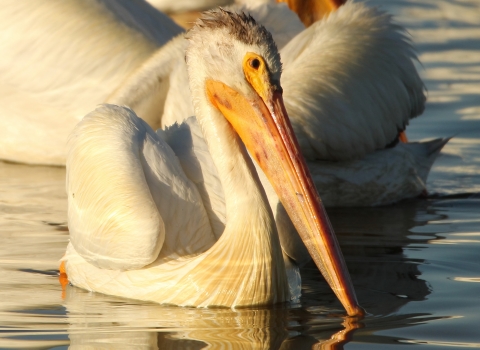The Biden-Harris administration today released the President’s Budget for Fiscal Year 2024. The proposed budget includes $2.1 billion to fund the U.S. Fish and Wildlife Service’s resource management and conservation programs and to support the administration’s priorities.
The 2024 budget request promotes strategic investments to implement the America the Beautiful initiative, including funds to conserve species and habitats, reconnect Americans with the outdoors, enable economic development, and to address climate change climate change
Climate change includes both global warming driven by human-induced emissions of greenhouse gases and the resulting large-scale shifts in weather patterns. Though there have been previous periods of climatic change, since the mid-20th century humans have had an unprecedented impact on Earth's climate system and caused change on a global scale.
Learn more about climate change impacts on the Service’s trust resources. The budget also includes $2 billion available under permanent appropriations, most of which is provided directly to states for fish and wildlife restoration and conservation.
“This budget is a vital and solid foundation supporting wildlife and habitat conservation in the face of climate change impacts,” said Service Director Martha Williams. “As we celebrate milestones like the 50th anniversary of the Endangered Species Act, the President’s FY 2024 budget request makes important investments in jobs and communities while conserving wildlife and natural resources cherished by our nation.”
The Endangered Species Act (ESA) turns 50 years old in 2023. Throughout the year, the Department of the Interior will celebrate the importance of the ESA in preventing the extinction of imperiled species, promoting the recovery of wildlife and conserving the habitats upon which they depend.
At the Service, the budget proposal would provide:
- $624.9 million, which includes $83.3 million in additional funding, for the National Wildlife Refuge System. This funding will enable refuges to improve their ability to conserve species and habitats and provide visitors with the opportunity to explore natural areas. The budget funding also expands opportunities for Americans in urban communities to connect with the outdoors and contribute to conservation.
- $384.5 million for the Ecological Services program to further the conservation of species listed under the ESA and to work to prevent at-risk species from becoming further imperiled. To facilitate consultation for infrastructure and other critical investments and address increasing needs for consultation in a growing economy, the Service is requesting $171.4 million for planning and consultation. Environmental review functions constitute a large and growing workload for the Service, which continuously seeks ways to improve the efficiency, consistency, transparency and effectiveness of environmental review and permitting development projects. The budget also proposes $133.3 million for recovery and delisting of species currently listed under the ESA. The ESA has been highly effective and credited with saving 99% of listed species from extinction. Preventing extinction and recovering listed species has always been, and will continue to be, one of the Service’s highest priorities.
- $280.4 million for asset maintenance and construction to address high-priority health and safety needs for Service-owned assets to begin a transition to a life-cycle maintenance strategy that will reduce long-term maintenance costs. Maintenance funding will support major energy and efficiency upgrades at fish hatcheries, coordination offices, and other facilities that are ineligible for deferred maintenance funding provided by Great American Outdoors Act Great American Outdoors Act
This landmark conservation law, enacted in 2020, authorizes the use of up to $1.9 billion a year in energy development revenues for five years for needed maintenance to facilities and infrastructure in our wildlife refuges, national parks, forests, recreation areas and American Indian schools.
Learn more about Great American Outdoors Act . - $259.8 million for the Fisheries and Aquatic Conservation Program, building on support in the Bipartisan Infrastructure Law Bipartisan Infrastructure Law
The Bipartisan Infrastructure Law (BIL) is a once-in-a-generation investment in the nation’s infrastructure and economic competitiveness. We were directly appropriated $455 million over five years in BIL funds for programs related to the President’s America the Beautiful initiative.
Learn more about Bipartisan Infrastructure Law with $18.6 million to provide for fish passage fish passage
Fish passage is the ability of fish or other aquatic species to move freely throughout their life to find food, reproduce, and complete their natural migration cycles. Millions of barriers to fish passage across the country are fragmenting habitat and leading to species declines. The U.S. Fish and Wildlife Service's National Fish Passage Program is working to reconnect watersheds to benefit both wildlife and people.
Learn more about fish passage improvements to restore native fish habitat and reconnect fish migration routes. The program’s budget also includes $49.1 million to address the continued threat of aquatic invasive species invasive species
An invasive species is any plant or animal that has spread or been introduced into a new area where they are, or could, cause harm to the environment, economy, or human, animal, or plant health. Their unwelcome presence can destroy ecosystems and cost millions of dollars.
Learn more about invasive species , including funding for a pilot project to demonstrate the effectiveness of rapid response in combatting these threats to habitat, infrastructure and native species. - $104.4 million for the Office of Law Enforcement, an increase of $12.3 million from the FY 2023 enacted level. The budget supports law enforcement efforts to combat wildlife trafficking, serve on the front lines to interdict illegal shipments of wildlife and products at U.S. ports of entry, and provide training to other nations to build local enforcement capabilities.
- $55.5 million for Science Applications, an increase of $20.1 million above the FY 2023 enacted level. The program supports science partnerships with states, Tribes, industry, local communities and other stakeholders to design and implement conservation and habitat management strategies that support the development of landscape conservation objectives such as biodiversity, adaptation and resilience.
- $26.7 million, $5.1 more than the FY 2023 enacted amount, for International Affairs to support expanded conservation capacity for iconic species, such as elephants and rhinos, ensure sustainable legal trade through the Convention on International Trade in Endangered Species of Wild Fauna and Flora, reduce the demand for illegal wildlife products, and to support climate adaptation and resiliency efforts.
- $8.2 million for the Office of Diversity, Inclusion, Equity and Accessibility, as well as an additional $3.5 million to support improved co-stewardship and engage with Tribes on Indigenous Traditional Ecological Knowledge research, conservation planning and management for the benefit of trust species through additional co-management agreements and partnerships.
For more information on the President’s FY 2024 Budget, please visit: https://www.whitehouse.gov/omb/budget/.



